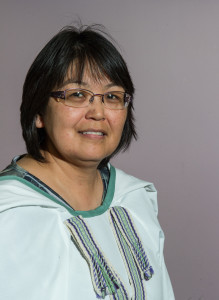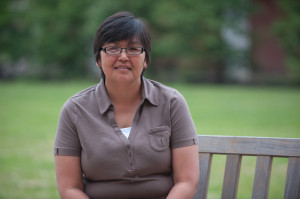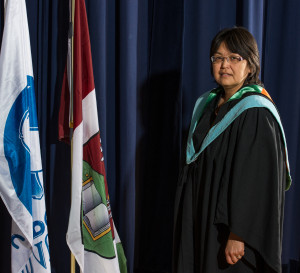The Different Names of Mosesie Qappik
Mary Etuangat ᒥᐊᓕ ᐃᑦᑐᐊᖓᑦ
Pangnirtung, NU
Abstract
In the mid-twentieth century, the forced relocation of Inuit from small hunting and fishing camps to larger, more central settlements shattered the longstanding ways of knowing and being that had defined relationships between people and their environment (Qikiqtani Truth Commission, 2010; Nunavut Tungavik Incorporated, 2012). Incorporating family trees, oral history and vivid autobiographical narrative, the author of this paper explores the impact of this relocation in the eastern Qikiqtani on her immediate and extended family. She concludes with the need for healing and the promise that it can happen.
Key Words: Qiqiktani, healing, cultural grief, relocation, Inuit
ᐊᔾᔨᒌᙱᑦᑐᑦ ᐊᑦᑎᖅᑕᐅᔾᔪᓯᖏᑦ ᒨᓯᓯ ᖄᐱᐅᑉ
ᒥᐊᓕ ᐃᑦᑐᐊᖓᑦ
ᐸᓐᓂᖅᑑᖅ, ᓄᓇᕗᑦ
ᐅᓂᒃᑳᖓ
ᕿᑎᕋᓕᖅᑎᓪᓗᒍ 1900ᖏᑦ, ᓅᑕᐅᓚᐅᖅᓯᒪᓂᖏᑦ ᐃᓄᐃᑦ ᓄᓇᒥᓐᓂᒃ ᐊᓯᕙᖅᑎᐅᓪᓗᑎᒃ ᐃᖃᓗᒐᓱᑦᑎᐅᓪᓗᑎᓪᓗ ᓄᓇᓕᕋᓛᖑᓂᖅᓴᓂᒃ ᐊᖏᓂᖅᓵᓗᓐᓄᑦ ᑲᑎᑕᐅᓪᓗᑎᒃ, ᐊᑕᐅᑦᓯᒥ ᑲᑎᙵᑎᑕᐅᓕᕋᒥ ᓱᕋᑦᑎᕆᓪᓚᕆᓚᐅᕐᖓᑦ ᐱᐅᓯᑐᖄᓗᖕᒥᑦ ᐃᒻᒪᑐᖄᓗᓂᒃ ᖃᐅᔨᒪᔭᐅᔪᑦ ᐱᐅᓰᓪᓗ ᑲᓱᖅᓯᒪᒍᑕᐅᓪᓚᕆᑦᑐᑦ ᐃᓚᒌᓐᓂᕐᒧᑦ ᐃᓅᖃᑎᒌᑎᒍᑦ ᐊᕙᑎᑦᑎᓐᓄᑦ ᑭᐱᔭᐅᓪᓗᓂ (ᕿᑭᖅᑕᓂ ᓱᓕᔪᒥᒃ ᑭᓪᓕᓯᓂᐊᖅᑏᑦ 2010; ᓄᓇᕗᑦ ᑐᙵᕕᒃ ᑎᒥᖓᑦ, 2012). ᐃᓚᓕᐅᔾᔨᕙᓪᓕᐊᓂᖅ ᓇᑭᙶᕐᒪᖔᕐᒥᒃ ᓯᕗᓕᕕᓂᖏᓐᓂᒃ ᑭᖑᕚᖏᓐᓄᑦ ᓇᓗᓇᐃᖅᑕᐅᕙᓪᓕᐊᓂᖏᑦ, ᐅᖃᐅᓯᒃᑯᑦ ᐅᓂᒃᑳᖅᑐᐊᑦ ᐱᐅᓯᕆᔭᐅᖃᑦᑕᕐᓂᑯᑦ ᐊᒻᒪ ᑕᑯᓐᓇᙳᐊᕋᑦᓴᐅᓪᓚᕆᑦᑐᓂᒃ ᐅᓂᒃᑳᕐᓂᒃᑯᑦ, ᑎᑎᕋᖅᑐᒥᓂᖅ ᐅᖃᓕᒫᒐᓕᐅᖅᑐᖅ ᕿᒥᕐᕈᓯᒪᒻᒪᑦ ᖃᓄᑎᒋ ᐃᑉᐱᓐᓇᖅᑎᒋᓚᐅᕐᒪᖔᑦ ᓅᑕᐅᓂᖅ ᕿᑭᖅᑖᓘᑉ ᑲᓇᓐᓇᖓᓂ ᐃᓚᖏᑦ ᖃᑕᙳᑎᒌᑦ ᐃᓚᔮᖏᓪᓗ ᐊᑐᓚᐅᖅᑕᖏᑦ ᕿᒥᕐᕈᓪᓗᓂᒋᑦ. ᐱᔭᕇᕈᑎᒋᓪᓗᒍ ᒪᒥᓴᕆᐊᖃᕐᓂᖅ ᐅᑉᐱᕆᓪᓗᓂᐅᓪᓗ ᓂᕆᐅᓐᓂᖅᑕᖃᕐᒪᑦ ᑲᔪᓯᓂᐊᕆᐊᖓ ᐊᓂᒍᕐᓂᐊᒥᒻᒪᑦ.
ᐅᖃᐅᓰᑦ ᓇᓂᓯᔾᔪᑏᑦ: ᕿᑭᖅᑕᓂ, ᒪᒥᓴᕐᓂᖅ, ᐃᓕᖅᑯᓰᖅᑕᐅᓂᑯᒧᑦ ᕿᑦᓵᓂᖅ, ᓅᑕᐅᓂᖅ, ᐃᓄᐃᑦ
Student biographies are also available.




